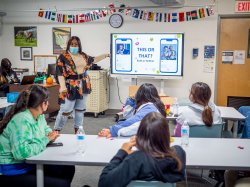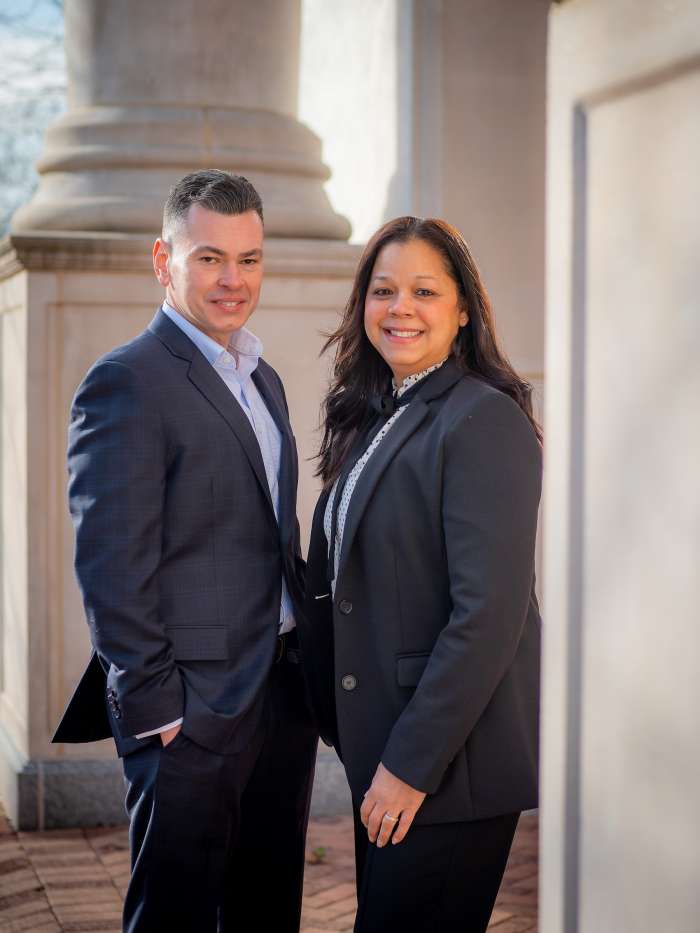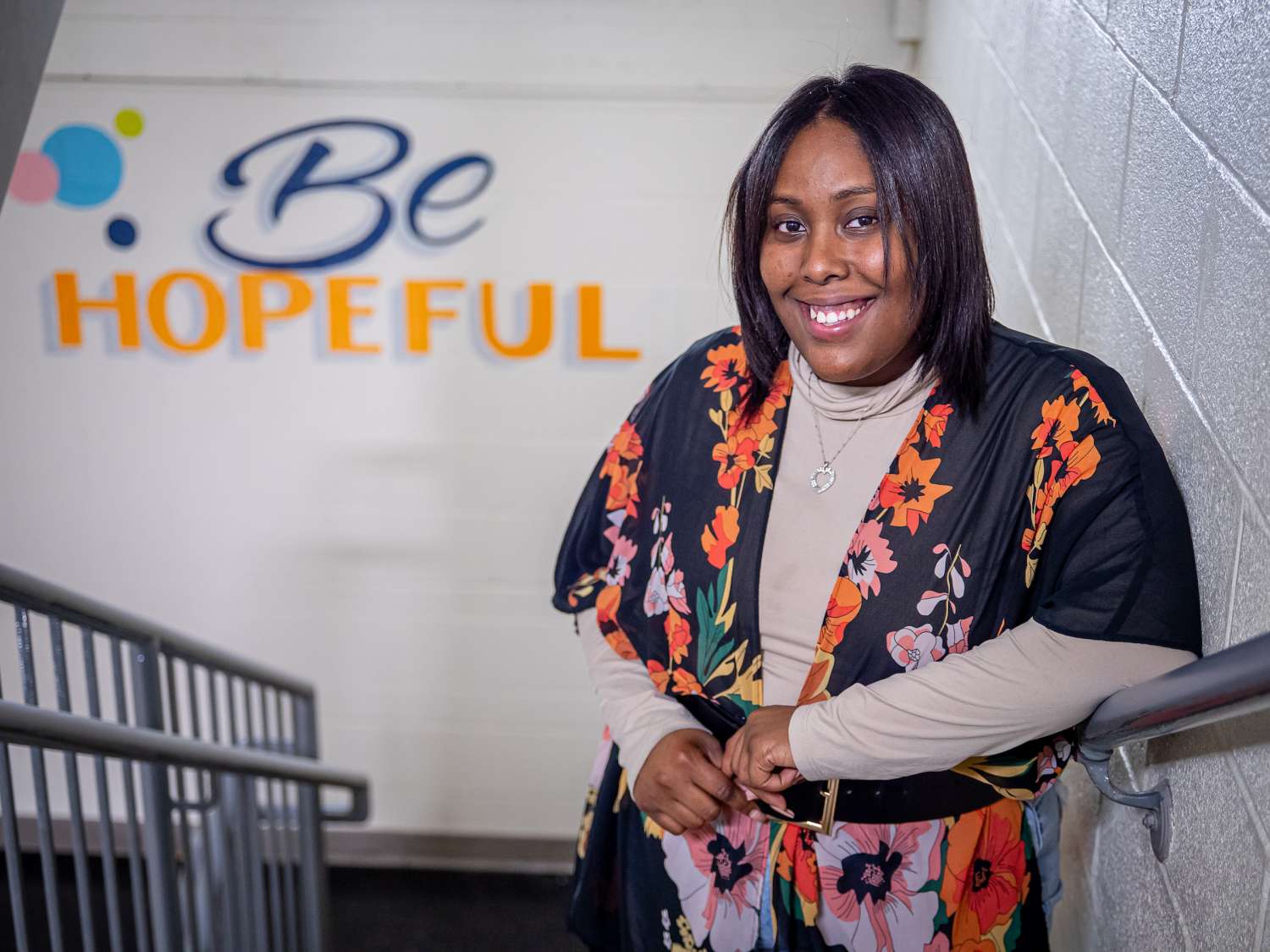Changing Lives in Paterson
University educates and empowers Paterson youth and young adults to make healthy life choices
Posted in: College News and Events

A dozen teen girls are gathered in small groups in a conference room at Oasis – A Haven for Women and Girls, a nonprofit located in the heart of Paterson, on a recent Monday afternoon.
Wheatherly Almonte ’20 breaks the chatter with, “Today’s topic is social media, social norms and peer pressure.” She has their attention.
In an interactive 45-minute session, the 23-year-old Almonte guides the girls, ages 13-17, through the benefits and dangers of social media, warning that they can’t believe everything they see on TikTok and that some people are living “Insta-lies.” She asks lots of questions: How many use various social media platforms? She ticks off a list. They all raise their hands indicating they are on TikTok and to a lesser extent on Instagram. The girls sheepishly respond to questions about their social media usage. Then Almonte quizzes them about what they see their friends doing on social media. Hands are raised, followed by rapid-fire replies:
“Drinking.”
“Smoking.”
“Vaping.”
“Partying.”
“Now we’re getting somewhere,” Almonte responds, handing each girl who participates in the discussion a ticket; there will be a prize drawing at the end of the seven-week program. She also presents the group with different scenarios and reminds them to use a decision-making tool they learned during a previous session. She then quizzes them on everything from how seeing their friends partying makes them feel to how vaping affects their lungs (one hour of vaping is the equivalent of smoking 100 cigarettes or five packs), how many cigarettes are in a pack and how old one has to be to buy them – all of which they also learned during a previous session. Scenarios and lessons are regularly tied back to “substance use and misuse,” as Almonte is teaching a new evidence-based curriculum which she learned and helped develop as a member of the P-CASA team.
Partnerships, Funding Aid Paterson
P-CASA stands for Paterson Coalition Against Substance Abuse, a collaborative effort between Montclair State University and a diverse group of community stakeholders in New Jersey’s third-largest city. P-CASA was founded in 2013 and its work is currently funded by a ten-year $1.25 million federal Drug-Free Communities grant from the Substance Abuse and Mental Health Services Administration, Center for Substance Abuse Prevention, which runs through 2023. In addition, P-CASA receives support from the White House Office of National Drug Control Policy and the Centers for Disease Control and Prevention.
The program is overseen by Family Science and Human Development Professors Robert Reid and Pauline Garcia-Reid, with Reid serving as principal investigator (PI) and program director and Garcia-Reid as co-PI and director of prevention services.

Garcia-Reid emphasizes that their work is meant to empower and not dictate.
“It is the giant E in C.O.P.E. that is driven through all of the work,” she says. “We’re not trying to direct people on how to live their lives; we’re trying to provide them with information so that they can make decisions and choices for their quality of life.”
The Reids are especially proud of empowering young people to affect change in their community. With the help of some P-CASA data showing that Paterson had more than 200 liquor establishments in an 8.2-square-mile area and that alcohol was available for purchase until 3 a.m., youth set about to change that. In July 2017, they showed up in council chambers in large numbers, armed with data, posters and a plea to improve their quality of life.
Despite opposition from liquor stores, the council voted unanimously in favor of reducing sales hours. The council, according to the Paterson Times, “enacted a new ordinance to force liquor stores to stop selling package goods – including beer and wine – after 10 p.m. The measure was heavily lobbied for by local young people and anti-drug advocates.”
Reid says, “It’s been pretty remarkable to change ordinances and get that on the books in the city of Paterson.”
Garcia-Reid credits her husband for the almost two decades of relationship building that has allowed them to continue to do this work in Paterson.
“Through this coalition work, he pulled in key players,” she says. “With multiple grants simultaneously, we’ve been able to harness the resources of each to compliment the other, so it’s been a really nice synergistic effect that has allowed us to really continue to work on various grants.”
The couple say they’re fortunate that their respective work compliments their partner’s.
“We’ve been able not just to marry our lives but marry our work,” Garcia-Reid says. “His passion has always been in substance abuse and HIV/AIDS, and my area has always been a focus on adolescent and youth development and building positive outcomes among them. So, we’ve been able to infuse both of our interests and research passions to come up with really solid proposals that have been fundable.”
Research indicates that the C.O.P.E. Initiative is working. Teenagers participating in the program “exhibited significant reductions in substance use and sexual risk behaviors and marked increases in social support, family cohesion and community involvement,” according to research conducted by the Center for Prevention Science at Rutgers University, the University of Iowa College of Public Health, and the University of New Mexico.
In addition, a recent P-CASA study indicates that “Paterson youth are increasingly seeing substance use (alcohol, tobacco, marijuana and e-cigarettes) and the perceived risks of these behaviors in a negative light.”
P-CASA Success Story

As someone who went through the P-CASA program and now works for it, Wheatherly Almonte is an example of its success personified. She started as an intern, working as an administrative assistant. She has since graduated from Montclair with a bachelor’s degree in Family Science and Human Development and a minor in Social Work and hopes to earn a master’s in social work. As a part-time University employee, Almonte serves as a P-CASA prevention specialist and lead facilitator. She attends and staffs a table at community events, informing people about P-CASA’s work in efforts to partner with more community organizations, such as Oasis.
The Reids say they’re pleased to have Almonte as a member of their team.
“Wheatherly’s a beautiful representative of her community and is doing really amazing things,” Garcia-Reid says. “We’re really fortunate to have her be part of our team. It’s really lovely to see the growth that our work has impacted, and we’re able to give back by hiring in the community.”
Crystal Marrero, the Teen Girl Coordinator at Oasis, says she appreciates Almonte’s contributions to the after-school program attended by the girls.
“Wheatherly’s from the community and has been able to step into the beat that the girls totally have,” she says. “She’s helped create a safe space for the girls to be comfortable, engaged and vulnerable.”
Yadary, a teen in Almonte’s class, agrees, noting that she appreciates the lessons and life skills she’s learning from Almonte.
“It’s good to be informed about substances, social media and safe sex,” she says. “As I grow older, I need to be careful what I do, and it’s good to be prepared as a young adolescent.”
About Almonte, Yadary, 15, adds: “She’s nice. I like her way of teaching, and she’s young, so she relates to us.”
It was only five years ago that Almonte was one of the high school teens listening to a P-CASA employee imparting similar lessons. Recalling her own experience while a student at John F. Kennedy Educational Complex, Almonte says she enjoyed the informational sessions.
“A lot of the information was stuff that we either didn’t know or we didn’t get enough of at school,” she says, adding that as a senior in high school she didn’t receive enough sex education at home or at school. “This is information that we should be giving us as early as possible. Because the reality is that in high school even freshmen sometimes are having sex, and it’s good to have these conversations because some parents are not having those conversations with their kids and it is always better for them to know.”
The same goes for substance use, she says.
“A lot of times, parents or teachers or anyone older, they tell them [youth], ‘Don’t do drugs. Don’t do drugs.’ But no one’s really informing them why they shouldn’t do drugs,” Almonte says. “They’re going to do it because they don’t know how it’s harming them. No one’s telling them how it’s affecting them.”
That’s where she comes in. Rather than lecture them or when she’s met with complete silence, she works to engage young people.
“When we go into the field, and we tell them, OK, this affects you this way, and you see their faces, they’re like, ‘Wow, I didn’t know that.’ When we teach HIV, which is my favorite topic, a lot of them have so many misconceptions on the topic,” she says. “Knowing that I’m going into the field, and I’m leaving them with a piece of knowledge – or even if it’s something that they know it’s a refresher for them – that’s what brings me joy doing this job.”
The oldest of seven children raised by a single mom, who helps make ends meet by working as an Uber and GrubHub delivery driver, Almonte recognizes that her life could have turned out differently, which is what drives her to help other young people.
“I beat the odds,” she says. “There were people in my life who believed in me, who saw something in me that I couldn’t see for myself. I wanted to give back to my community. I wanted to pour into the youth the same way that I, myself, was poured into.”
Almonte was already passionate about community service and P-CASA provided her an opportunity to directly impact her town of Paterson.
“Everyone sees Paterson as this bad place, but Paterson has so much good in it also that a lot of people don’t see,” Almonte says. “So, I am blessed enough to be a part of that. Giving back to the community is good.”
Story by Staff Writer Sylvia A. Martinez, Photos by University photographer Mike Peters
